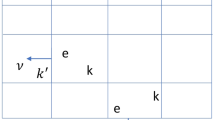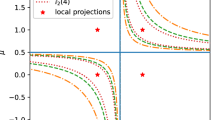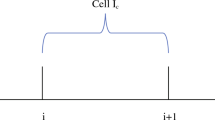Abstract
In this paper we study explicit peer methods with the strong stability preserving (SSP) property for the numerical solution of hyperbolic conservation laws in one space dimension. A system of ordinary differential equations is obtained by discontinuous Galerkin (DG) spatial discretizations, which are often used in the method of lines approach to solve hyperbolic differential equations. We present in this work the construction of explicit peer methods with stability regions that are designed for DG spatial discretizations and with large SSP coefficients. Methods of second- and third order with up to six stages are optimized with respect to both properties. The methods constructed are tested and compared with appropriate Runge–Kutta methods. The advantage of high stage order is verified numerically.







Similar content being viewed by others
References
Butcher, J.C.: General linear methods. Acta Numer. 15, 157–256 (2006)
Calvo, M., Montijano, J.I., Rández, L., Van Daele, M.: On the derivation of explicit two-step peer methods. Appl. Numer. Math. 61(4), 395–409 (2011)
Cockburn, B., Shu, C.W.: TVB Runge–Kutta local projection discontinuous Galerkin finite element method for conservation laws II: general framework. Math. Comput. 52(186), 411–435 (1989)
Cockburn, B., Shu, C.W.: The Runge-Kutta local projection \(P^1\)-discontinuous Galerkin finite element method for scalar conservation laws. Math. Model. Numer. Anal. 25(3), 337–361 (1989)
Cockburn, B., Shu, C.W.: Runge–Kutta discontinuous Galerkin methods for convection-dominated problems. J. Sci. Comput. 16(3), 173–261 (2001)
Constantinescu, E., Sandu, A.: Optimal explicit strong-stability-preserving general linear methods. SIAM J. Sci. Comput. 32, 3130–3150 (2009)
Dahlquist, G.: A special stability problem for linear multistep methods. BIT 3, 27–43 (1963)
Gottlieb, S., Ketcheson, D.I., Shu, C.W.: Strong Stability Preserving Runge–Kutta and Multistep Time Discretizations. World Scientific, Singapore (2011)
Horváth, Z., Podhaisky, H., Weiner, R.: Strong stability preserving explicit peer methods. In: Report 04, Martin Luther University Halle-Wittenberg, http://www.mathematik.uni-halle.de/institut/reports/ (2014)
Horváth, Z., Podhaisky, H., Weiner, R.: Strong stability preserving explicit peer methods. J. Comput. Appl. Math. 296, 776–788 (2016)
Izzo, G., Jackiewicz, Z.: Strong stability preserving general linear methods. J. Sci. Comput. 65, 271–298 (2015)
Jackiewicz, Z.: General Linear Methods for Ordinary Differential Equations. Wiley, Chichester (2009)
Ketcheson, D.I., Ahmadia, A.: Optimal stability polynomials for numerical integration of initial value problems. Commun. Appl. Math. Comput. Sci. 7(2), 247–271 (2013)
Ketcheson, D.I., Gottlieb, S., Macdonald, C.B.: Strong stability preserving two-step Runge–Kutta methods. SIAM J. Numer. Anal. 49(6), 2618–2639 (2011)
Klinge, M.: Peer-Methoden für DG-Diskretisierungen. In: Master’s thesis, Martin Luther University Halle-Wittenberg (2016)
Kubatko, E.J., Bunya, S., Dawson, C., Westerink, J.J.: Dynamic \(p\)-adaptive Runge–Kutta discontinuous Galerkin methods for the shallow water equations. Comput. Methods Appl. Mech. Engrg. 198(21–26), 1766–1774 (2009)
Kubatko, E.J., Westerink, J.J., Dawson, C.: Semi discrete discontinuous Galerkin methods and stage-exceeding-order strong-stability-preserving Runge–Kutta time discretizations. J. Comput. Phys. 222(2), 832–848 (2007)
Kubatko, E.J., Yeager, B.A., Ketcheson, D.I.: Optimal strong-stability-preserving Runge–Kutta time discretizations for discontinuous Galerkin methods. J. Sci. Comput. 60(2), 313–344 (2014)
Kulikov, G.Y., Weiner, R.: Variable-stepsize interpolating explicit parallel peer methods with inherent global error control. SIAM J. Sci. Comput. 32(4), 1695–1723 (2010)
Li, G., Xing, Y.: Well-balanced discontinuous Galerkin methods for the Euler equations under gravitational fields. J. Sci. Comput. 67(2), 493–513 (2016)
Mirabito, C., Dawson, C., Kubatko, E.J., Westerink, J.J., Bunya, S.: Implementation of a discontinuous Galerkin morphological model on two-dimensional unstructured meshes. Comput. Methods Appl. Mech. Eng. 200(1–4), 189–207 (2010)
Reed, W.H., Hill, T.R.: Triangular mesh methods for the neutron transport equation. In: Technical Report LA-UR-73-479 p. Los Alamos Scientific Laboratory (1973)
Rhebergen, S., Bokhove, O., van der Vegt, J.J.W.: Discontinuous Galerkin finite element methods for hyperbolic nonconservative partial differential equations. J. Comput. Phys. 227(3), 1887–1922 (2008)
Sanz-Serna, J.M., Verwer, J.G., Hundsdorfer, W.H.: Convergence and order reduction of Runge–Kutta schemes applied to evolutionary problems in partial differential equations. Numer. Math. 50(4), 405–418 (1987)
Schmitt, B.A., Weiner, R., Beck, S.: Two-step peer methods with continuous output. BIT Numer. Math. 53(3), 717–739 (2013)
Shampine, L.F., Reichelt, M.W.: The MATLAB ODE suite. SIAM J. Sci. Comput. 18(1), 1–22 (1997)
Spijker, M.N.: Stepsize conditions for general monotonicity in numerical initial value problems. SIAM J. Numer. Anal. 45, 1226–1245 (2007)
Trahan, C.J., Dawson, C.: Local time-stepping in Runge–Kutta discontinuous Galerkin finite element methods applied to the shallow-water equations. Comput. Methods Appl. Mech. Eng. 217–220, 139–152 (2012)
Weiner, R., Biermann, K., Schmitt, B.A., Podhaisky, H.: Explicit two-step peer methods. Comput. Math. Appl. 55(4), 609–619 (2008)
Weiner, R., Schmitt, B.A., Podhaisky, H., Jebens, S.: Superconvergent explicit two-step peer methods. J. Comput. Appl. Math. 223, 753–764 (2009)
Acknowledgements
The authors are grateful to the anonymous referees for their valuable remarks and comments on the paper.
Author information
Authors and Affiliations
Corresponding author
Appendix: Coefficients of the New DGSSP-Optimized Explicit Peer Methods
Appendix: Coefficients of the New DGSSP-Optimized Explicit Peer Methods
See Tables 5, 6, 7, 8, 9, 10, 11, 12.
Rights and permissions
About this article
Cite this article
Klinge, M., Weiner, R. Strong Stability Preserving Explicit Peer Methods for Discontinuous Galerkin Discretizations. J Sci Comput 75, 1057–1078 (2018). https://doi.org/10.1007/s10915-017-0573-x
Received:
Revised:
Accepted:
Published:
Issue Date:
DOI: https://doi.org/10.1007/s10915-017-0573-x




